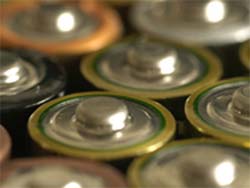Future notebook batteries will be made from ... Polymer
A battery technology introduced since the last 9 years has also seen the same light, after years of being shaded by lithium ion.
Soon, laptop makers will switch to lithium polymer batteries instead of the popular lithium ion technology, Sony Electrics chairman Stan Glasgow said.
Lithium Polymer batteries use lithium as the main active ingredient. This is an unstable substance, however, in this battery pack, lithium will not be packed inside "cells" like current lithium ion batteries. Instead, it will be covered with a polymer gel layer. Of course, the energy density of polymer batteries cannot be as high as lithium ion, but this is its "plus point".
 Source: BBC Manufacturers, specifically Sony, try to increase the energy density of lithium ion batteries. But when internal short-circuiting occurs, it can lead to chain reaction and burn.
Source: BBC Manufacturers, specifically Sony, try to increase the energy density of lithium ion batteries. But when internal short-circuiting occurs, it can lead to chain reaction and burn.
Dell, Lenovo, Toshiba, Apple Computer and many others, along with Sony, have all tasted the pain of this situation. Nearly 10 million lithium ion batteries have been recalled around the world in recent months.
From a historical perspective, polymer batteries have never been able to deliver the long battery life required by manufacturers and consumers. Mitsubishi has been using polymer batteries in its prematurely dead Pedion line since 1997. Although there are a few new features in the design that are thinner and have a shiny silver finish, it costs nearly $ 6,000. .
Despite the floating fate of polymer batteries, designers still favor this technology, because the gel pack can be easily compressed into any free space inside the device. Moreover, over time, polymer technology is also increasingly improved. Some carriers even use it inside cell phones.
To deal with the explosion risk of lithium ion batteries, some companies are releasing non-lithium batteries. For example, Zinc Matrix Power and PowerGenix are promoting zinc-based batteries for laptops. Zinc Matrix said it will start shipping this battery from 2007.
However, Sony's chairman of Glasgow believes that new battery technologies need more time to market. "I guess at least 12-18 months".
MTI Micro Fuel Cells is also trying to promote fuel cells, which use methanol to generate electricity. It is also a promising battery technology and is being developed in many countries around the world instead of lithium ion batteries.
Trong Cam
You should read it
- ★ New technology helps prevent smartphone batteries from catching and exploding
- ★ What is solid battery? Will they solve the battery life problem?
- ★ Silver zinc batteries are over 40% longer than lithium batteries
- ★ Australia makes batteries that 'like' heat and never explode
- ★ Toshiba accelerated production of ultra-fast rechargeable laptop batteries